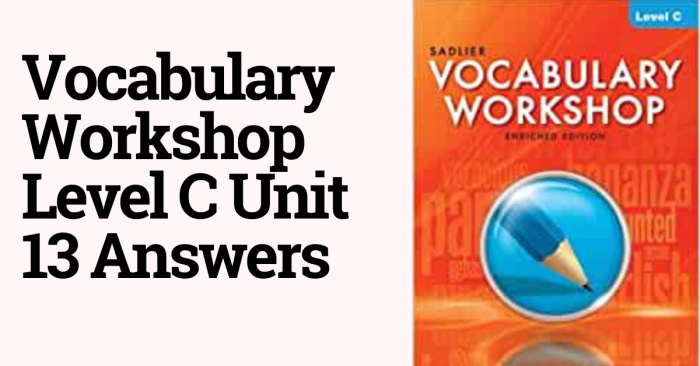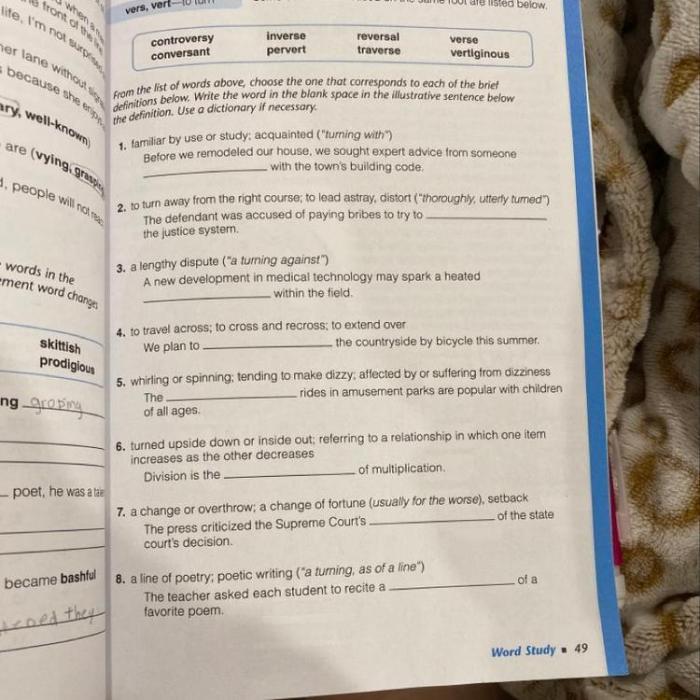Welcome to the realm of vocabulary enrichment, where Vocabulary Workshop Unit 14 Level C Answers serves as your trusted guide. This comprehensive resource delves into the intricacies of language learning, empowering you to expand your vocabulary and master the nuances of word usage.
Through a meticulous exploration of word families, root words, and etymology, this guide unlocks the secrets of vocabulary expansion. Discover strategies for leveraging context clues, flashcards, and immersive reading to enhance your linguistic prowess.
Vocabulary Overview
Vocabulary is the set of words known and used by a person or group of people. It is an essential component of language learning, as it allows individuals to express themselves and understand others.
Words are often grouped into families based on their shared root word. A root word is the basic form of a word, from which other words can be derived. For example, the root word “dict” means “to say” or “to speak.”
From this root, we can derive words such as “dictate,” “diction,” and “dictionary.”
There are many strategies for expanding vocabulary. Reading is one of the most effective ways to learn new words, as it exposes learners to a wide variety of language. Using context clues is another helpful strategy. When reading, learners can use the surrounding words and sentences to infer the meaning of unfamiliar words.
Flashcards are also a useful tool for vocabulary learning. Flashcards can be used to practice recalling words and their definitions. Learners can write the word on one side of the card and the definition on the other side. They can then quiz themselves by looking at the word and trying to recall the definition, or vice versa.
Unit 14 Level C Vocabulary: Vocabulary Workshop Unit 14 Level C Answers

The following is a list of vocabulary words from Unit 14 Level C:
- Allude(v.): to refer to something indirectly or subtly
- Colloquial(adj.): informal or conversational in style
- Connotation(n.): an idea or feeling that is associated with a word or phrase
- Denotation(n.): the literal or dictionary meaning of a word or phrase
- Euphemism(n.): a mild or indirect word or phrase that is used in place of a more offensive or unpleasant one
- Figurative language(n.): language that uses words or phrases in a non-literal way to create a vivid or imaginative effect
- Idiom(n.): a phrase or expression that has a figurative meaning that is different from the literal meaning of the individual words
- Jargon(n.): specialized language used by a particular group of people
- Metaphor(n.): a figure of speech that compares two things that are not alike in a literal sense but have something in common
- Oxymoron(n.): a figure of speech that combines two contradictory terms
- Paradox(n.): a statement that seems contradictory but may contain some truth
- Personification(n.): a figure of speech that gives human qualities to nonhuman things
- Simile(n.): a figure of speech that compares two things using the words “like” or “as”
- Symbol(n.): something that represents something else
Vocabulary Activities
Here are some engaging activities to help students practice and retain the vocabulary words from Unit 14 Level C:
- Word sorts:Students can sort the vocabulary words into different categories, such as parts of speech, figures of speech, or words related to a specific topic.
- Crossword puzzles:Students can complete crossword puzzles that include the vocabulary words as clues.
- Sentence writing:Students can write sentences using the vocabulary words. They can focus on using the words correctly in context and understanding their different meanings.
- Word games:Students can play word games such as Scrabble or Bananagrams using the vocabulary words.
- Discussions:Students can discuss the meanings of the vocabulary words and how they are used in different contexts.
Assessment and Evaluation

It is important to assess students’ vocabulary knowledge to ensure that they are understanding and retaining the new words they are learning. There are many different methods of assessment, including:
- Quizzes:Quizzes can be used to test students’ knowledge of the vocabulary words. Quizzes can be multiple choice, fill-in-the-blank, or short answer.
- Tests:Tests can be used to assess students’ overall knowledge of the vocabulary words. Tests can include a variety of question types, such as multiple choice, fill-in-the-blank, short answer, and essay.
- Portfolios:Portfolios can be used to collect students’ work over time. Portfolios can include quizzes, tests, writing samples, and other assignments that demonstrate students’ vocabulary knowledge.
Commonly Asked Questions
What is the significance of vocabulary in language learning?
Vocabulary forms the foundation of language comprehension and expression. It enables you to understand complex concepts, communicate effectively, and appreciate the nuances of written and spoken language.
How can I effectively expand my vocabulary?
Immerse yourself in reading, utilize context clues, employ flashcards, and engage in regular practice through games and exercises.
What role does etymology play in vocabulary development?
Etymology provides insights into the historical origins and relationships between words, enhancing your understanding of their usage and meaning.